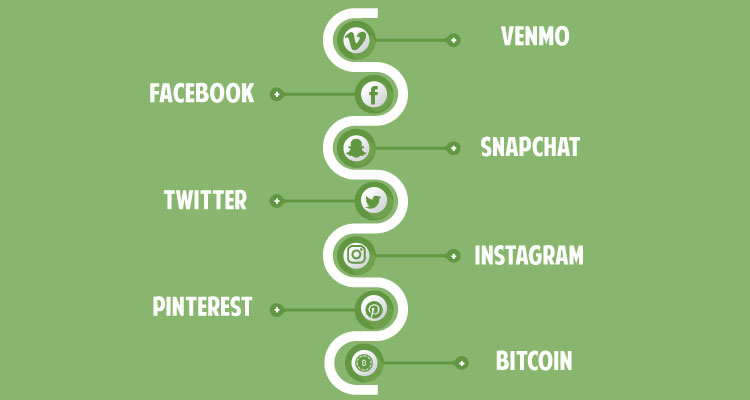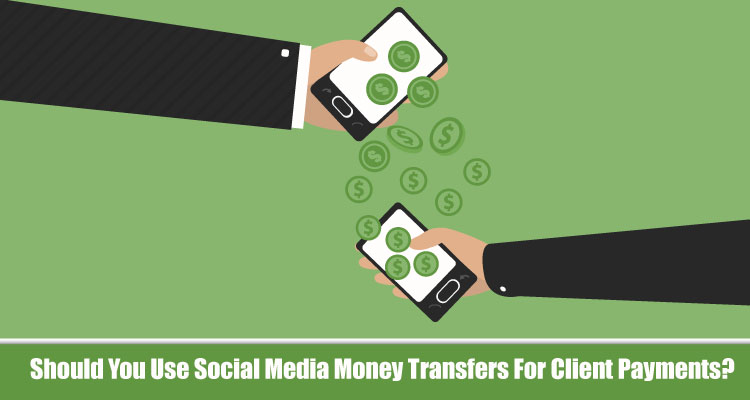For freelancers and small business owners there’s a plethora of options when accepting payments from clients. One of the newer, and more interesting, options are social media payments. But, should you accept these social media money transfers from your clients?

Money Transfers Through Social Media
There’s no shortage of peer-to-peer payments options using social media.
Here’s a quick rundown of those leading the pack:
- Venmo. While not necessarily a social media platform, Venmo is one of the most popular P2P payment apps available. It’s a digital wallet that operates like Facebook, in fact you can use your Facebook account to join, in that you can view your friends transactions in a news feed.
- Facebook. The most popular social network is now allowing users to transfer funds through Facebook Messenger. It’s fast, convenient, and users aren’t charged a fee.
- Snapcash. By partnering up with Square, users can transfer money using Snapchat. It funds aren’t claimed within 24 hours the transaction is cancelled and returned to the sender.
- Twitter, Instagram, Pinterest “Buy Buttons.” Businesses can now sell their products directly on their social channels by embedding a “Buy Button.” These buttons haven’t exactly taken off as expected, but it’s an options for online merchants.
- Bitcoin wallets. It may have taken some time, but it finally looks like bitcoin is about to go mainstream. Thanks to wallets like iPayYou, Bitwala, and QuickCoin, you can now transfer bitcoins securely through social channels.

The Advantages of Using Social Media to Transfer Money
Sure. Sending and receiving money via social media is becoming more commonplace. But, should you accept payments from clients this way?
In my opinion, it’s worth at least investigating for the following reasons:
- It’s fast and affordable. The main advantage of transferring funds through social media is that money travels quickly after just a few clicks. In fact, transactions almost instant. It’s also affordable.As mentioned earlier, it’s free in Facebook Messenger and wallets like iPayYou charge a low 0.5 percent flat fee. That’s particularly appealing for cross-border payments.
- Allows clients to make direct payments. Social media payments let your clients pay you directly on your social channels so that they don’t have to find you elsewhere online.That can come in handy if you have an online storefront since it doesn’t redirect customers to another location.
- It’s secure. While there have been security concerns over apps like Venmo, social mediums are relatively secure. “Facebook’s really on top of authenticating their users,” says Robert Siciliano, security expert with the hotspot shield AnchorFree.”They provide two-factor authentication for device security and for user security. That’s optional for most users, but I think that if they make it [mandatory] I think that would be even better, especially for payment security.”
Bitcoin wallets use blockchain technology so all data is encrypted.
- Provides data insights. Social media provides a wealth of valuable information and analytics on users so that you can create content and target clients based on their previous behavior.It’s a great way to generate future revenue by building long-lasting relationships with clients and find new freelancing gigs.
- Mobile usage is on the rise. Not only do around 90% of adults have a mobile payments account, 40% of Facebook users access the channel exclusively through its mobile app.For Millennials and people living in developing countries who rely heavily on their mobile devices, don’t be surprised if both of those figures skyrocket in the very near future.
Conclusion
Not all of your clients are going to be comfortable with sending you a payment through social media.
However, between the steep rise in social media usage, along with the surge of smartphones and mobile payments, transferring funds through Facebook Messenger, for example, is becoming more commonly accepted – especially among some Millennials and users in developing countries.
If you and your clients are hesitant, just be aware that these payments are fast, affordable, and secure. In short, it’s a win-win for everyone.
Have you accepted money transfer through social media? If so, how was the experience?













